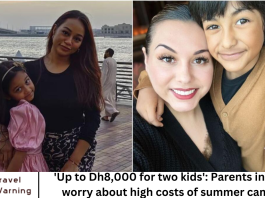Ivy League degrees, prestigious awards and a multitude of hobbies — these Dubai-based Thomas sisters are well-rounded, high-achieving students. Interestingly, they never graduated from a traditional school with classrooms and teachers; instead, they were homeschooled by their parents.
Recently, Dorothy Thomas — the second of the sisters — was conferred the prestigious Richard J. Estes global citizenship award from her alma mater, University of Pennsylvania.
The award is usually given to a graduating student from the University of Pennsylvania’s Nonprofit Leadership Program with a record of academic excellence and who is committed to social impact and using their talents and knowledge to make a difference in the world.
The award is usually given to a graduating student from the University of Pennsylvania’s Nonprofit Leadership Program with a record of academic excellence and who is committed to social impact and using their talents and knowledge to make a difference in the world.

Dorothy, who completed her masters in non-profit leadership with a perfect 4.0 GPA, said being homeschooled set her up for success. “The flexibility of homeschooling allowed us to do so much more than what we could have done in a normal school,” she told Khaleej Times. “It was tailored to bring the best out of us. My parents were very strict about the time we woke up, the structure of the day, turning in our homework and our grades. It helped build discipline in us.”
Dorothy’s sisters are also Ivy League students. Her elder sister Stefanie Danielle has two bachelor degrees from Arizona State University and Liberty University. She has a Master’s degree from Harvard University and has specialised in leadership and business management. Their youngest sister Darianne is currently in her final year of her Bachelor’s programme at the University of Pennsylvania. In 2021, she received the US president’s award for academic excellence.

Choosing to homeschool
Their father Ashish Thomas, a resident of Dubai for 37 years, said it was a conscious but difficult decision by him and his wife, Rekha, to pull their children out of the traditional schooling method. “I felt their teachers were not qualified enough,” he said. “One year you got a good teacher and the next year, you didn’t. It was affecting the quality of their education.”
It was then that the couple realised that they were taking all the efforts needed to educate their children. “They were award-winning students but my wife was spending a lot of time on them at home,” he said. “Once, we enrolled them for swimming classes at school but even after a year, they had not learnt how to float. So we signed them up for private classes and they all became excellent swimmers. We realised that their school did not have the ability to bring out the best in our children. We also did not want our children learning bad language and attitudes from other students in the class. Also, their personality was getting affected.”

He admitted that it was quite a “drastic” step at the time. “It was in 2005 that we started exploring the options,” he said. “It was not a very well-known concept and there was no clear cut guide on how to go forward. But my wife was very confident that she could take over their education completely because she was already spending so much time grooming them. I spoke to a very learned man called Dr. Lakshman Madurasinghe, who helped me research and find the best curriculum that we could use.”
The family began with a tailored curriculum from South Africa, then shifted to an American curriculum, to align with their plans to pursue higher education in the United States. The completed the exam papers given by the curriculum providers every year, before taking the SAT exam, a globally recognised college admission test.

The homeschooled girls
Danielle was in Grade 4, Dorothy was in Grade 2 and Darianne was a baby when they switched to homeschooling.
Danielle said she still remembered the day her family made the decision. “We were on a family holiday on a farm in Ireland and we ran over to new friends we had made saying we don’t have to go to school any more,” she said. “Some of the teachers were abusive in the school I attended and I didn’t enjoy my experience. I personally enjoyed academics much more while being homeschooled than when I was in school. I think if I ever have children, I would definitely homeschool them.”
All three girls began working on their talents and picked up several hobbies, thanks to the flexibility and freedom their schedule offered them. They are all accomplished artists who dabble with oil paintings and pencil sketches. They also took up horse-riding and several other sports including football. The family also travelled extensively — to more than 70 countries so far — so that the children could learn about various cultures.

“I had set a different timetable for each of them because they were all going in different directions,” said Rekha Thomas. “They had one timetable for when we were in Dubai and another one when we were travelling. When in Dubai, they started at 9am and then we would have breaks in between. In the lower classes, they studied for fewer hours but as they went into higher grades, the hours of studies began to increase.”
Darianne, who never attended traditional school in her life, said that although there are many stereotypes about homeschooled students, she and her sisters never faced those challenges. “We were enrolled in several activities and we interacted with many students of various ages,” she said. “When we travelled, we would actively seek out friends, many of whom we are still in touch with today. It gave us the opportunity to interact with people of various cultures.”
Frequently Asked Question
Who are the three sisters mentioned in the story?
The three sisters are from Dubai and were homeschooled. They later excelled academically and gained admission to prestigious universities around the world.
What is unique about their education?
The sisters were homeschooled, which allowed them a flexible and personalized learning experience tailored to their needs and strengths.
Which universities did the sisters attend?
The sisters gained admission to some of the world’s best universities, including top institutions in the United States and the United Kingdom.
What subjects or fields did the sisters pursue in university?
The specific fields of study are not always mentioned, but given their academic success, they likely pursued competitive and high-achieving programs in areas such as science, technology, and engineering.
How did homeschooling contribute to their success?
Homeschooling offered a more individualized education, helping them focus on their academic strengths, develop critical thinking skills, and prepare for university-level studies.
Why is this story significant?
The success of these sisters highlights the potential benefits of homeschooling in an era where personalized education is becoming more valued, and it challenges traditional notions of academic achievement based on conventional schooling.
What message does this story send to other families?
The story encourages families to explore alternative education options like homeschooling, demonstrating that with dedication and the right resources, students can achieve success in the world’s most competitive academic environments.
Conclusion
The story of the three sisters from Dubai serves as an inspiring example of how homeschooling can be a powerful tool for academic success. Their journey demonstrates that with a personalized approach to education, students can thrive and gain admission to some of the world’s most prestigious universities. This narrative not only challenges traditional educational models but also encourages families to consider alternative paths that can help unlock their children’s full potential. Ultimately, it underscores the importance of dedication, adaptability, and the right educational environment in shaping future leaders and achievers.




